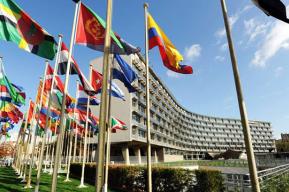News
UNESCO launches Women 4 Ethical AI Platform
As societies rely more and more on digital technology, tech-enabled violence, gender-biased misinformation and fake news increase, hindering women and girls’ participation and safety online. This global phenomenon transcends borders and requires a multilateral response.

On 6 March 2023, the 67th Session of the Commission on the Status of Women (CSW67) opened with a focus on the priority theme “Innovation and technological change, and education in the digital age for achieving gender equality and the empowerment of all women and girls”. To truly have impact in this area, UNESCO's Social and Human Sciences Sector launched the Women 4 Ethical AI Platform at this occasion, on the same day.
Some countries around the world still have laws that discriminate against women and this appalling situation is being repeated in the digital space. That is why there is a need to fill the digital revolution with an ethical purpose, that fasters gender equality now.
This new Platform will provide a unique space for global gender quality leaders in frontier technologies to combine their strengths and influence to achieve the clear goal of implementing UNESCO’s Recommendation on the Ethics of Artificial Intelligence with a gender lens. This global instrument is the first global normative standard in the field of AI, adopted by all 193 Member States of the Organisation at its 41st General Conference in 2021. It offers a full chapter of action-oriented policy recommendations to address gender-related challenges in AI. This includes: Dedicating funds from the public budgets linked to financing gender-related schemes, which unfortunately is often lacking or insufficient. Ensuring that national digital policies include a gender action plan. Encouraging female entrepreneurship, participation, engagement and leadership in all stages of the AI life cycle; Investing in targeted programmes to increase the opportunities of girls’ and women’s participation in STEM and ICT disciplines; Eradicating gender stereotyping and ensuring that discriminatory biases are not translated into the AI systems.
With the Recommendation, UNESCO will engage women in AI to advance the ethical development and deployment of AI, for fair and inclusive outcomes, with a special focus on gender diversity and empowerment.
The Platform was inaugurated during a high-level event at CSW67 on: “The Gender Digital Revolution: Addressing Ethics of Artificial Intelligence, Access to Information and Gendered Online Violence” in the presence of Itah Kandjii Murangi, Minister of Higher Education, Training and Innovation of Namibia.
UNESCO promised, and UNESCO delivers on the wider commitment of promoting gender equality in the digital domain and the establishment of the Women for Ethical AI platform is the realization of a promise fulfilled.
UNESCO spotlighted different but interlinked issues at the event in two consecutive panels. The first, “New Policy Actions to Avoid Gender Stereotypes and Bias in AI”, provided policy advice for decision-makers legislating on AI. The second, “Promoting Gender Responsive Policies to Guarantee Women’s Right of Access to Information in the Digital Age and Combatting Gendered Online Violence”, presented concrete ways to strengthen gender equity in the rights of access to information and freedom of expression in digital spaces.
The 67th session of the Commission on the Status of Women will conclude on 17 March with an outcome document on agreed conclusions on the priority theme, negotiated by all Member States.
I've been repeatedly asked "Can you hire more women?" The question was wrong. The question should have been "How can we grow the pipeline of women candidates?" and "How can you support the women already in the workforce today?". It takes a multistakeholder approach, starting with companies helping to upskill women.
The 67th session of the Commission on the Status of Women will conclude on 17 March with an outcome document on agreed conclusions on the priority theme, negotiated by all Member States.









